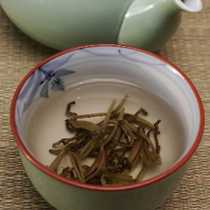When an unhappy liver leads to fatigue, weight gain, poor concentration and mood swings, naturopathic tonics might cure your ills
Joanne Sasvari
Sun

Green tea is a strong antioxidant that aids digestion. To be good to your liver, be sure to eat a low-fat diet, drink lots of water, cut down on alcohol and get plenty of exercise. Photograph by : Ian Smith, Vancouver Sun
Feeling a bit puffy? Lethargic? Pasty, cranky and dull? Could be because you spent the last two months turning your liver into foie gras.
Since we’re feeling a bit liverish ourselves after an overly festive season, we thought we’d skip the cocktails this week and start the New Year with a round of — yum — liver tonics.
Now, you probably don’t think about your liver much. It’s the dependable supporting actor in the cast of all your organs — hardworking and not terribly glamorous, but you’d sure notice if it wasn’t there.
The liver’s main job is to clean your blood. According to the Canadian Liver Foundation, it also fights off infections, regulates hormones and supplies your body with energy.
It does all this by processing everything you eat, drink or inhale.
And when your diet consists largely of cookies, canapes and lashings of liquor, the result is an overworked, fatty liver.
An unhappy liver can lead to fatigue, weight gain, mood swings and poor concentration.
It can take a toll on your looks, too, giving you brittle nails, dull hair and unhealthy-looking skin. In extreme cases, it can progress to serious liver diseases such as cirrhosis.
the solution
So what can you do about it? Skip the booze and try a liver tonic instead.
You can do this the naturopathic way.
You can find liver supplements that contain herbs such as milk thistle or St. Mary’s thistle, which is especially popular as a liver tonic in Europe. Also believed to be beneficial are wormwood, Oregon grape, dandelion, burdock, red clover and golden seal.
Or you can do this a more delicious way.
You can, for instance, whip up an Indian curry with turmeric. This pungent spice contains curcumin, which is antioxidant, anti-amyloid and anti-inflammatory and, reportedly, can do wonders for the liver. So can certain mushrooms, such as shiitakes, and cruciferous vegetables, such as broccoli, cauliflower, kale and bok choy.
You can also sip green tea, a strong antioxidant that helps digestion, or lemonade, which contains vitamin C, an antioxidant said to reduce toxic damage to the liver. You can also enjoy the lively, liver-friendly flavours of lemon balm, cayenne or ginger. (See above for an easy recipe for ginger tea.)
Or you can do as the Canadian Liver Foundation sensibly suggests, and follow a varied, low-fat diet, drink lots of water, cut down on alcohol and get plenty of exercise.
After all, in cultures that link emotions to physical health, the liver is the source of anger, resentment, irritability and bitterness.
Given that it’s also the body’s biggest internal organ and the only one that can regenerate itself, do you really want to aggravate it any further?
Joanne Sasvari is a freelance writer.
– – –
GINGER TEA
Ginger tea is believed to act as a tonic for your liver. It is also thought to improve digestion, relieve nausea and help ward off colds and flu.
1 piece fresh ginger root, about 2 inches (5 cm) long
4 cups (1 L) water
Honey and lemon to taste (optional)
Peel ginger root and slice it thinly.
In a saucepan, bring water to a boil. Add ginger. Cover and reduce heat; simmer tea for 15 to 20 minutes. Strain the tea. Add honey and lemon to taste.
HELP AT HAND
If you are seriously concerned about your (or a friend’s) liver health, skip the tonics and go see your doctor. Or check the Canadian Liver Foundation website at www.liver.ca for more information.
© The Vancouver Sun 2007

